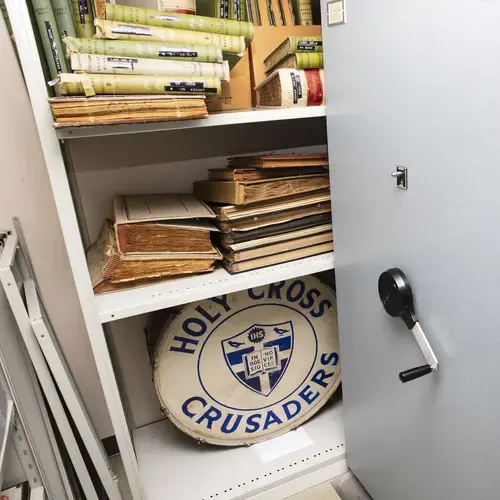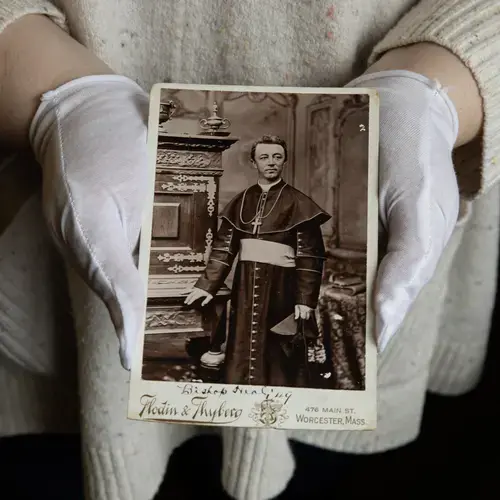Ask an Archivist
General questions about the Holy Cross Archives and Distinctive Collections can either be submitted through the Ask an Archivist Form, or by emailing archives@holycross.edu.


We work to preserve the College's history, foster a scholarly research environment and acquire items reflective of our diverse academic community. We seek to make these materials as accessible as possible through an active instruction program, scholarly collaborations, robust online repositories, digitization and exhibitions.
The College Archives & Distinctive Collections maintains a wide variety of physical and digital materials.
Explore a day in the life of students at the College of the Holy Cross from Spring 1940 to Spring 1941.
Get a glimpse of what student life was like during the beginning of World War II.
Learn about members of the Holy Cross community who served in World War II and other campus events.
This exhibit tells the story of the beginning of co-education at Holy Cross from 1967, when women attended classes during Co-Ed Day, to 1976, when the first fully co-educational class walked across the stage at commencement. The stories of these early women Crusaders are told through videos, news clippings, photographs and other archival materials drawn from the Holy Cross Archives and Distinctive Collections.
This timeline captures milestones in co-education from 1967, when the first Co-Ed Days were held, to the present. Photographs and other archival materials drawn from the Holy Cross Archives and Distinctive Collections are used to illustrate these important moments.
The following is a digital interactive recreation of a physical exhibit that was displayed in Hogan Campus Center in March 2019. It was created by Stephanie Yuhl, PhD, Nora Grimes '19, Emma Powell '20 and Matthew Picarillo '26.
Appointments are encouraged but not required during our open hours for current HC faculty, staff or students. Morning hours are available by appointment only. Appointments may be requested by emailing archives@holycross.edu with at least 24 hours in advance. Please include information about the materials you wish to use in your email.
Public researchers are required to schedule an appointment to visit the Archives, regardless of whether it is morning (appointment only) or afternoon/evening (open for drop in). A public researcher is defined as anyone who is not a current HC faculty, staff or student.
The College of the Holy Cross Archives and Distinctive Collections has a responsibility to maintain all material entrusted to its care in good condition. All researchers must comply with the Reading Room Usage guidelines.
| Title | Phone | |
|---|---|---|
| Abby Stambach, Head of Archives and Distinctive Collections | astambac@holycross.edu | (508) 793-2506 |
| Rev. Joseph Bruce, S.J., Curator of the Deaf Catholic Archives | jbruce@holycross.edu | |
| Sarah Campbell, Archivist | scampbel@holycross.edu | (508) 793-2575 |
| James Damon, Archives Evening Supervisor | jdamon@holycross.edu | (508) 793-2570 |
| Rachel Green, Digital Collections Specialist | ragreen1@holycross.edu | (508) 793-2522 |
| Lenora Robinson, Digital Initiatives Archivist | lrobinso@holycross.edu | (508) 793-3509 |
| Lisa Villa '90, Public Services and Engagement Archivist | lvilla@holycross.edu | (508) 793-2642 |